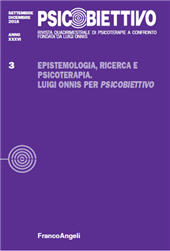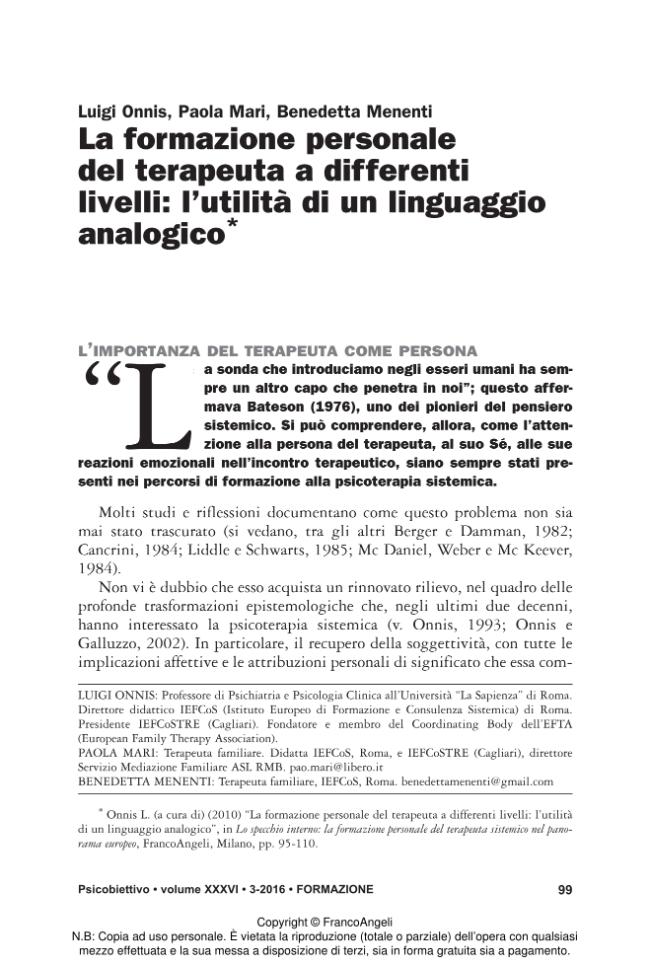La formazione personale del terapeuta a differenti livelli : l'utilità di un linguaggio analogico
99-112 p.
In questo articolo, gli Autori descrivono un modello di lavoro sulla persona del terapeuta sistemico, adottato nel programma di training degli Istituti Italiani IEFCoSTRE. Essi sottolineano che la formazione personale del terapeuta non necessita di spazi particolari separati da quelli del training, perché questi potrebbero diventare spazi troppo specificatamente terapeutici (ad eccezione che in quei casi in cui l'allievo richieda chiaramente una terapia personale); al contrario gli autori ritengono che il lavoro sulla persona del terapeuta debba svolgersi all'interno del processo formativo, attraverso le diverse fasi del suo sviluppo. Gli Autori distinguono quattro livelli: a) il lavoro sulla storia familiare dell'allievo; b) l'analisi delle dinamiche interpersonali nel gruppo di training; c) il lavoro sull'allievo attraverso la supervisione diretta, che permette l'analisi delle sue reazioni emozionali nell'impatto con la famiglia durante la terapia; d) il lavoro sull'allievo attraverso la supervisione indire
tta, che permette di valutare la capacità dell'allievo di governare il proprio mondo interno, il proprio "Sé" in terapia. Gli Autori focalizzano il discorso, in particolare, sul primo di questi livelli, il lavoro sulla storia familiare dell'allievo, che comincia col genogrammna e continua con altre costruzioni analogiche e metaforiche (sculture, fiabe, racconti metaforici). Essi sottolineano l'utilità di lavorare con un linguaggio analogico e metaforico che è particolarmente efficace nel permettere che possa emergere ciò che, abitualmente, non può essere espresso con le parole: "nodi" non risolti e inconsapevoli del mondo interno dell'allievo, che non possono essere immediatamente esplorati attraverso il pensiero razionale. Viene presentato, a scopo esemplificativo, il lavoro sulla storia familiare di un'allieva. Più in generale gli Autori sottolineano che l'intero processo del training può essere interpretato in termini di ciclo vitale dell'allievo orientato ad acquisire una progressiva autonomia e individua
zione del proprio "essere terapeuta". [Testo dell'editore].
In this article, the authors describe a working model on the systemic therapist, adopted in the training program of the Italian Institutes IEFCoSTRE. They underline that the training of the therapist does not need particular spaces separate from those of the training, as these might become too specific therapeutic spaces (except in those cases in which the student clearly requires a subjective therapy); on the contrary, the authors believe that the work on the therapist has to take place within the educational process, through the different stages of its development. The authors identify four levels: a) the work on the student's family history; b) the analysis of interpersonal dynamics in the training group; c) the work on the student through direct supervision, which allows to analyse the impact of emotional reactions with family during therapy; d) the work on the student through indirect supervision, which allows to evaluate the student's ability to govern their own inner world, one's "Self" in therapy. The
authors focus the discussion, in particular, on the first of these levels, the work on the student's family history, which starts with the genogram and continues with other analog and metaphorical constructions (sculptures, fairytales, metaphorical narratives). They accentuate the usefulness of working with an analog and metaphorical language which results to be particularly effective in allowing to emerge what, usually, cannot be expressed with words: "nodes" unresolved and unconscious of the student's inner world, which cannot be immediately explored through rational thought. It is presented, by way of example, the work on the family history of a student. More generally, the authors point out that the entire training process can be interpreted in terms of student life cycle oriented to acquire a progressive autonomy and individuation of "being a therapist". [Publisher's Text].
-
Articles from the same issue (available individually)
-
Information
ISSN: 1972-487X
DISCIPLINES
KEYWORDS
- Sviluppo personale del terapeuta, training sistemico, storia familiare, linguaggio metaforico
- Personal Development of the Therapist, Systemic Training, Family History, Metaphorical Language



